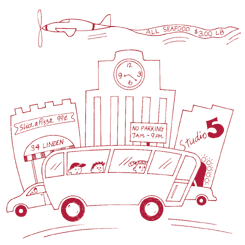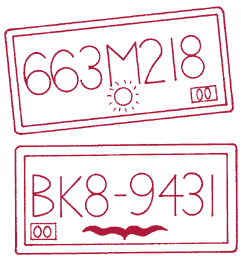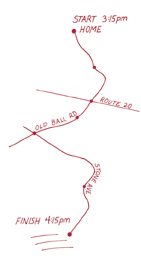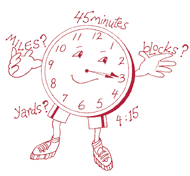|
Math on the Go
In this busy world, we spend a lot of time moving from place to place in our cars, on buses and trains, and on foot. Use your traveling time as an opportunity to learn about math. Look around as you travel from place to place, and help your child find numbers on buildings, buses, taxis, and houses that they can add and subtract while on the road. Not only will your child be learning and practicing math skills, but the time you spend traveling will go by more quickly as well.
 Number Search
Number Search (Grades K-3)
What you'll need:
Paper, pencil, and ruler
- Create a chart that lists the numbers from 1 to 50.
- Write down each number as family members locate that number on a car, a sign, a building, or other objects in your community.
- Write down words that have numbers in them, such as "onestop shopping," "twoday service," "buy one, get one free," or "open seven days a week."
Parent Pointer - This activity provides children with lots of opportunities to practice number recognition, as well as counting and writing skills. |
 Total It
Total It (Grades 3-5)
What you'll need:
License plates, paper, pencil, and calculator
- As you are traveling in your car, or on a bus, each person takes turns calling out a license plate number.
- All players try to add the numbers in their heads. Talk about what strategies were used in the mental math addition. Were the numbers added by 10's like 2+8? Were doubles like 6+6 added?
- Try different problems using the numbers in a license plate. For example, if you use the plate number 663M218, ask "Using the numbers on the plate, can you make 5?"
- 5 using two numbers? "Yes, 3+2 = 5"
- 5 using three numbers? "Yes, (3+2) x 1 = 5"
- 5 using four numbers? "Yes, (6+3+1) ÷ 2 = 5"
- 5 using five numbers? "Yes, (6+6+3) - (8+2) = 5"
- 5 using six numbers? "Yes, (6+6) + (3x1) - (8+2) = 5"
Try using a calculator to play these games. See if you can solve these problems faster using the calculator.
Parent Pointer - The problem-solving and computational skills your child uses in this activity are very important to mental math skills, and they also help your child to be creative with numbers. |
 How Long? How Far?
How Long? How Far? (Grades 1-3)
What you'll need:
Information about how far you're traveling and how long it will take
Many times when you are on the go, you are headed somewhere that requires you to be there by a certain time.
- Ask your children how far they think you have traveled and how much more you have to travel.
- Talk about how long it takes to get to your destination. If it is 3:15 now, and it takes 45 minutes to get there, ask if you will make it for a 4:15 appointment? How much extra time will there be? Will we be late?
Parent Pointer - This car, bus, or train traveling exercise provides many opportunities for children to use mental math and estimation to calculate time and distance problems. |
 Ease on Down the Road
Ease on Down the Road (Grades 2-5)
What to do:
- A gallon of gas costs $1.24 a gallon. What does it cost for 5 gallons? 10 gallons? 15 gallons? 20 gallons? What is an easy way to figure this out? How can you estimate the cost by rounding the cost per gallon?
- The speed limit is 55 miles per hour. How far will you go in 1 hour? Two hours? Three hours? How long will it take to go 500 miles?
Use a calculator to check your answers.
Parent Pointer - An important algebra concept is finding relationships between two quantities such as miles per hour or cost per gallon. |
Math Activities for Grades K-5:
|
|
|